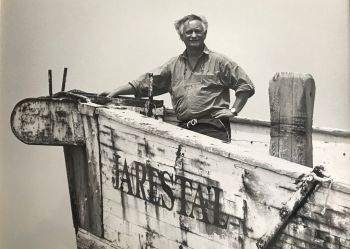Obituary: Michael Land
By: Jessica Gowers
Last updated: Monday, 4 January 2021

Summer 1993, Beaufort in North Carolina. The boat is stranded on the mud, where Mike spent many happy hours chasing fiddler crabs with a remote-controlled Tonka truck – low-tech science. Photo courtesy, Kate Land.
Michael F. Land, Emeritus Professor, died on 14 December 2020 aged 78.
Mike Land’s research wove a bright and original thread through the tapestry of visual science, following a unique path, lighting up new fields and making fundamental contributions. He had many collaborators from here and abroad who became and remained firm friends.
As a teacher he had the ability to communicate the essence of a subject in a pithy, memorable and easily assimilated way and also to encourage and inspire individual students to think about things in a new and straightforward manner. The same spirit suffused his writing of papers, reviews and books, which were informative and enjoyable.
Mike studied Zoology at the University of Cambridge, graduating in 1963, followed by a PhD at University College London supervised by John Gray and Andrew Huxley. There he showed that scallops focus light on the retinae of their 200 eyes by means of tiny mirrors acting like a Newtonian telescope.
After his PhD, in 1969 he became an Assistant Professor at the University of California, Berkeley where he turned to jumping spiders and examined the anatomy of their eyes – just eight this time – all fixed to the carapace. Only the two forward looking eyes have high acuity vision. Mike showed how the retina itself scans across the scene to enhance the eyes’ field of view in way that picks out important features like prey and mates.
Mike returned to the UK in 1971, as a Lecturer in Neurobiology at the University of Sussex. He was promoted to Reader in 1977 and to Professor of Neuroscience in 1984 – after election to the Fellowship of the Royal Society in 1982 at the early age of 39. Further honours followed: membership of the Frink Medal of the Zoological Society in 1994; the Alcon Prize for Visual Research in 1996; a member of the Academia Europea from 1998.
At Sussex, Mike had a major role in developing the Neurobiology degree, one of the first in the UK. He first continued with his work on invertebrate vision and visually guided behaviour. He made memorable studies on a dizzying array of species with varying eye designs and behaviour. For instance, flies, mosquitoes, clams, and mantid shrimps, which have a record number of colour and polarization channels, used in a unique way. Mike studied in particular how male flies pursue mates and the retinal specializations that enable males to do it (but neglected how unwilling females escape).
Later, Mike used a similar naturalistic approach in examining how people deploy their eye movements, first in everyday tasks like tea making and driving, then progressing to sports and games. Eye movements are a window into how people attend to the world around them and the strategies that they use to accomplish skilled tasks, like hitting or catching a cricket ball and organising a sequence of actions e.g. putting tea in the pot before adding water. This late period of Mike’s research, attracting psychologists as well as biologists, is just as influential as his early and middle periods.
Mike retired from full time academic work in 2005 as an Emeritus Professor. He continued his research and writing, publishing an acclaimed book on Animal Eyes, with Dan-Eric Nillson; another with a former graduate student, Ben Tatler, on human eye movements Looking and Acting; and a final book, Eyes to See, covering many of the topics that absorbed him.
Mike loved to tinker and build his own equipment for his experiments from stuff lying around – perhaps a carryover from University College London, where army surplus shops used to be a happy hunting ground for penurious researchers. He also made jewellery, sketched, gardened with enthusiasm, and loved orchids. Music was important to him. He sang in the East Sussex Community Choir. Renaissance wind instruments fascinated him. He learnt how to make a Crum horn at West Dean and played the Curtal for Sussex Harmony, a West Gallery Quire. He was immensely sociable, enjoying talk and gossip of all kinds in pubs, restaurants, homes, boats. We will all miss him.
He is survived and deeply missed by Rosemary and Judith, children Kate and Adam, and four grandchildren.
Authors: Paul Benjamin and Thomas Collett
